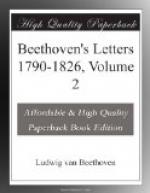Hummel, Johann Nepomuk, the celebrated composer and pianist, a pupil of Mozart, and for some time Beethoven’s rival in love matters, having married the sister of the singer Roeckel, to whom Beethoven also was much attached (see also Schindler’s “Biography,” i. 189).
Hungary, Beethoven there.
Imperial Court at Vienna.
Imperial High Court of Appeal, letter from Beethoven to the.
Jenger, Chancery officer in the Imperial War Office at Vienna, a passionate lover of music.
Kalkbrenner.
Kandeler, testimonial from Beethoven in favor of.
Kanne, F.A., at Vienna, highly appreciated in his day as a poet, composer, and critic, an intimate friend of Beethoven, and occasionally his guest (see also Schindler’s “Biography,” i. 228).
Kauka, Dr., Beethoven’s advocate in Prague.
Kiesewetter, Councillor von, in Vienna, the popular writer on the science of music, one of the subscribers to the great address presented to Beethoven in February, 1824.
Kinsky, Prince Ferdinand, of Bohemia, one of Beethoven’s most devoted patrons in Vienna.
Kinsky, Princess.
Kirnberger, of Berlin, the well-known theorist.
Koch, Barbara, of Bonn, daughter of the landlord of the “Zehrgaden,” the friend of Eleonore von Breuning, an amiable and intelligent lady, at whose house the leading persons of the town were accustomed to assemble; she afterwards became governess to the children of Count Belderbusch, whom she married in 1802.
Koenneritz, Von, principal director of the Court band and Opera in Dresden.
Kraft, Anton, a celebrated violoncello-player in Vienna.
Kuhlau, Friedrich, the distinguished flute-player,
a great admirer of
Beethoven’s music.
Kuehnel, in Leipzig. See Hofmeister.
Laibach, the Philharmonic Society of.
Landrecht, Beethoven’s address to the honorable members of the.
Leidesdorf, M.J., composer and music publisher in Vienna, a subscriber to the great address presented to Beethoven in 1824.
Leipzig “Allgemeine Zeitung,” established in 1798; its remarks at first unfavorable towards Beethoven.
Lichnowsky, Count Moritz, brother of Prince Carl Lichnowsky, and, like him, the friend and patron of Beethoven. Schindler, in his “Biography,” i. 241, n., relates as follows:—“The acute perception of the Count led him, on a nearer acquaintance with the work, to surmise that it had been written with some special intentions. On being questioned on this matter, the author replied that he had intended to set the Count’s love-story to music, and that if he needed titles for it, he might write over the first piece, ‘Fight between Head and Heart,’ and over the second, ’Conversation with the Loved One.’ After the death of his first wife, the Count had fallen deeply in love with a distinguished opera singer, but his friends protested against such an alliance. After a contest of many years’ duration, however, he at last succeeded, in 1816, in removing all hindrances to their union.”




